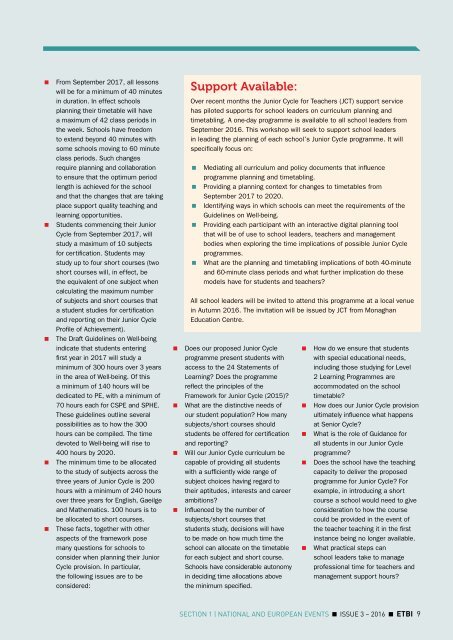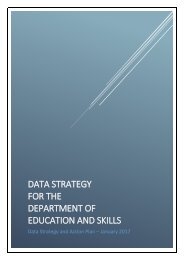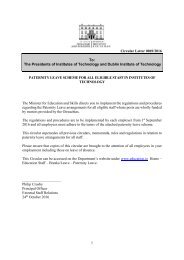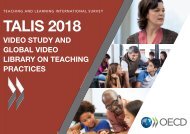ETBI-News-Summer-2016-web
ETBI-News-Summer-2016-web
ETBI-News-Summer-2016-web
You also want an ePaper? Increase the reach of your titles
YUMPU automatically turns print PDFs into web optimized ePapers that Google loves.
From September 2017, all lessons<br />
will be for a minimum of 40 minutes<br />
in duration. In effect schools<br />
planning their timetable will have<br />
a maximum of 42 class periods in<br />
the week. Schools have freedom<br />
to extend beyond 40 minutes with<br />
some schools moving to 60 minute<br />
class periods. Such changes<br />
require planning and collaboration<br />
to ensure that the optimum period<br />
length is achieved for the school<br />
and that the changes that are taking<br />
place support quality teaching and<br />
learning opportunities.<br />
Students commencing their Junior<br />
Cycle from September 2017, will<br />
study a maximum of 10 subjects<br />
for certification. Students may<br />
study up to four short courses (two<br />
short courses will, in effect, be<br />
the equivalent of one subject when<br />
calculating the maximum number<br />
of subjects and short courses that<br />
a student studies for certification<br />
and reporting on their Junior Cycle<br />
Profile of Achievement).<br />
The Draft Guidelines on Well-being<br />
indicate that students entering<br />
first year in 2017 will study a<br />
minimum of 300 hours over 3 years<br />
in the area of Well-being. Of this<br />
a minimum of 140 hours will be<br />
dedicated to PE, with a minimum of<br />
70 hours each for CSPE and SPHE.<br />
These guidelines outline several<br />
possibilities as to how the 300<br />
hours can be compiled. The time<br />
devoted to Well-being will rise to<br />
400 hours by 2020.<br />
The minimum time to be allocated<br />
to the study of subjects across the<br />
three years of Junior Cycle is 200<br />
hours with a minimum of 240 hours<br />
over three years for English, Gaeilge<br />
and Mathematics. 100 hours is to<br />
be allocated to short courses.<br />
These facts, together with other<br />
aspects of the framework pose<br />
many questions for schools to<br />
consider when planning their Junior<br />
Cycle provision. In particular,<br />
the following issues are to be<br />
considered:<br />
Support Available:<br />
Over recent months the Junior Cycle for Teachers (JCT) support service<br />
has piloted supports for school leaders on curriculum planning and<br />
timetabling. A one-day programme is available to all school leaders from<br />
September <strong>2016</strong>. This workshop will seek to support school leaders<br />
in leading the planning of each school’s Junior Cycle programme. It will<br />
specifically focus on:<br />
Mediating all curriculum and policy documents that influence<br />
programme planning and timetabling.<br />
Providing a planning context for changes to timetables from<br />
September 2017 to 2020.<br />
Identifying ways in which schools can meet the requirements of the<br />
Guidelines on Well-being.<br />
Providing each participant with an interactive digital planning tool<br />
that will be of use to school leaders, teachers and management<br />
bodies when exploring the time implications of possible Junior Cycle<br />
programmes.<br />
What are the planning and timetabling implications of both 40-minute<br />
and 60-minute class periods and what further implication do these<br />
models have for students and teachers?<br />
All school leaders will be invited to attend this programme at a local venue<br />
in Autumn <strong>2016</strong>. The invitation will be issued by JCT from Monaghan<br />
Education Centre.<br />
Does our proposed Junior Cycle<br />
programme present students with<br />
access to the 24 Statements of<br />
Learning? Does the programme<br />
reflect the principles of the<br />
Framework for Junior Cycle (2015)?<br />
What are the distinctive needs of<br />
our student population? How many<br />
subjects/short courses should<br />
students be offered for certification<br />
and reporting?<br />
Will our Junior Cycle curriculum be<br />
capable of providing all students<br />
with a sufficiently wide range of<br />
subject choices having regard to<br />
their aptitudes, interests and career<br />
ambitions?<br />
Influenced by the number of<br />
subjects/short courses that<br />
students study, decisions will have<br />
to be made on how much time the<br />
school can allocate on the timetable<br />
for each subject and short course.<br />
Schools have considerable autonomy<br />
in deciding time allocations above<br />
the minimum specified.<br />
How do we ensure that students<br />
with special educational needs,<br />
including those studying for Level<br />
2 Learning Programmes are<br />
accommodated on the school<br />
timetable?<br />
How does our Junior Cycle provision<br />
ultimately influence what happens<br />
at Senior Cycle?<br />
What is the role of Guidance for<br />
all students in our Junior Cycle<br />
programme?<br />
Does the school have the teaching<br />
capacity to deliver the proposed<br />
programme for Junior Cycle? For<br />
example, in introducing a short<br />
course a school would need to give<br />
consideration to how the course<br />
could be provided in the event of<br />
the teacher teaching it in the first<br />
instance being no longer available.<br />
What practical steps can<br />
school leaders take to manage<br />
professional time for teachers and<br />
management support hours?<br />
Section 1 | National and European Events issue 3 – <strong>2016</strong> <strong>ETBI</strong> 9





